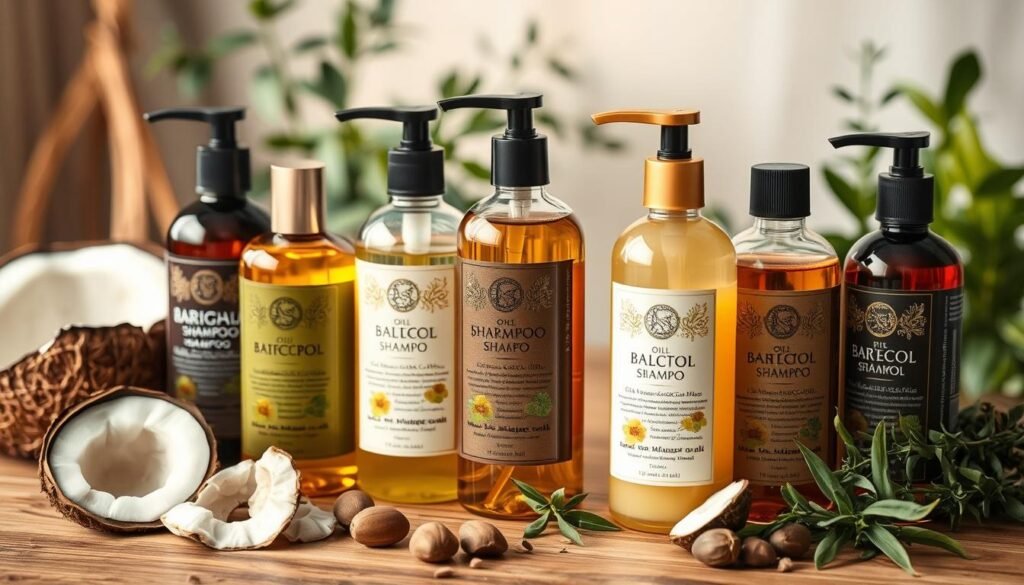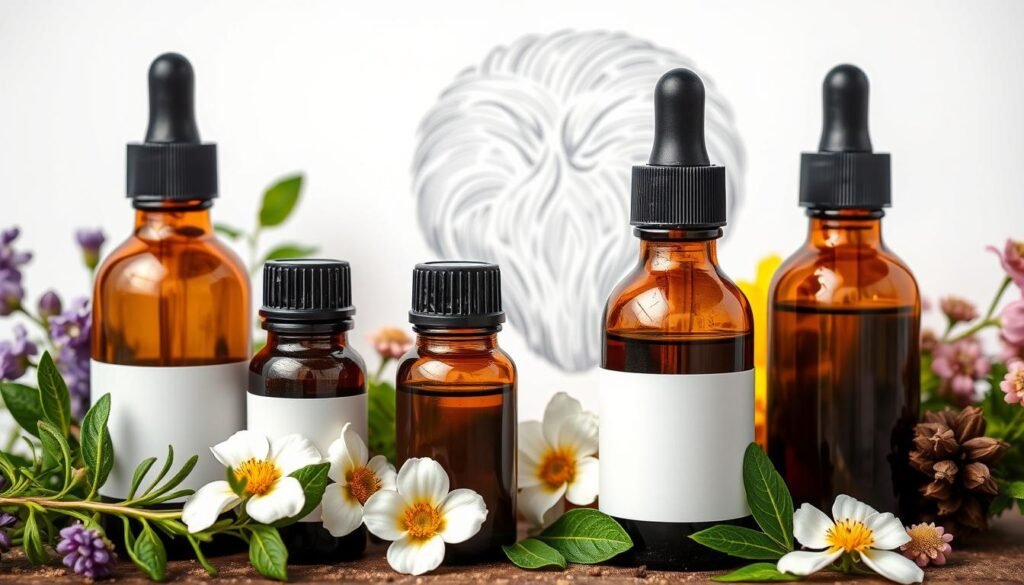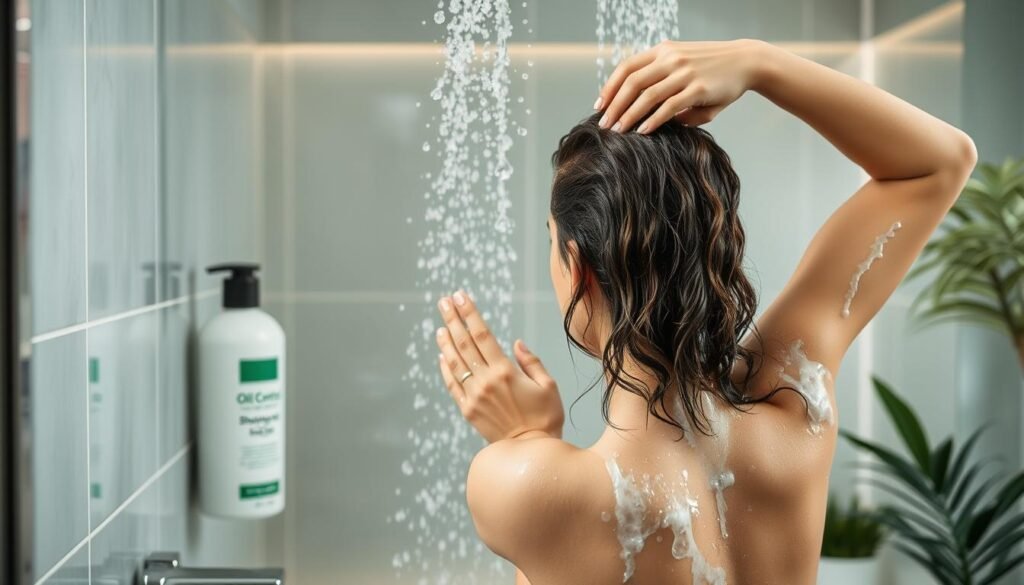Did you know nearly 80% of people with oily hair can’t find the right shampoo? It’s crucial to pick the right products for oily hair. Balancing oils in shampoo is essential, not just a trend. It helps keep hair looking great and healthy without making it too greasy.
Using advanced science and knowing how oils help hair can lead to amazing results. This means better scalp health and balanced, beautiful hair.
Finding the perfect shampoo is easier than you think. Armed with the right knowledge and products, anyone can make choices that improve their hair’s health. We’ll look into oily hair problems, healthy hair habits, and how choosing the best ingredients can transform hair care.
Key Takeaways
- Understand the unique needs of oily hair for effective treatments.
- The role of oils in shampoo formulations is crucial for managing sebum production.
- Selecting the right ingredients can significantly improve scalp health.
- Regular cleansing and proper application techniques enhance hair integrity.
- Natural oils can provide hydration and prevent damage.
- Balancing oils in shampoo contributes to healthier hair overall.
Understanding Oily Hair and Its Needs
Oily hair often comes from producing too much oil on the scalp. The sebaceous glands on the scalp make sebum. Sebum is a natural oil that keeps hair healthy and moist. But when too much is made, hair looks greasy and unkempt. It’s important to know why oily hair happens to manage it well.
What Causes Oily Hair?
Many things can make your hair oily. Changes in hormones can do it, like during puberty or pregnancy. Genetics matter too; oily hair can run in families. Places with high humidity can also make hair oilier. Stress can make it worse by causing more oil to be made. Understanding these causes is the first step to fixing oily hair.
The Role of Sebum in Hair Health
Sebum does have its benefits for hair. It keeps hair shiny and prevents dryness. But too much sebum causes dandruff and itching. If you have oily hair, how often you wash it matters. You might need to wash it daily or every other day with the right products.
Choosing the right products is key. Look for ones made for oily hair. It’s also smart to follow proper scalp hygiene tips found at reputable sites. For example, this guide for dandruff prevention can help. When conditioning, only apply it to the ends to prevent more oiliness.
| Factor | Impact on Oily Hair |
|---|---|
| Hormones | Can increase oil production, especially during puberty or hormonal changes. |
| Genetics | Family history often influences the tendency for oily hair. |
| Humidity | High humidity levels can worsen oiliness and make hair feel greasy. |
| Stress | Triggers hormonal changes that can elevate oil production. |
Importance of Shampoo Formulations for Oily Hair
For those with oily hair, choosing the right shampoo is key to maintaining healthy hair. The best shampoos not only clean but also keep your scalp’s natural oils balanced. There are many kinds of shampoos out there. Some are better for oily hair than others. It’s important to know the differences so you can pick the best ingredients. These should tackle oil production without drying out your scalp.
Selecting the Right Ingredients
Look for ingredients in shampoos that balance sebum while cleaning well. Some good choices include:
- Salicylic acid, known for its ability to penetrate deeply and reduce oil buildup.
- Tea tree oil, which possesses antibacterial properties and can help prevent acne-like breakouts on the scalp.
- Clay and charcoal, effective in drawing out impurities and excess oils.
- Lightweight conditioners that do not weigh hair down, contrasting with silicones that can exacerbate greasiness.
Together, these ingredients make shampoos more effective. They ensure a thorough clean and support healthy oil levels.
How Shampoo Affects Oil Production
Shampoo can affect how much oil your scalp produces. Washing too often can disturb your scalp’s balance. This might make your scalp produce more oil. Using gentle shampoos with natural surfactants can help keep things balanced. Studies show shampoos with synthetic detergents, like anionic detergents, are great for oily hair. They clean really well. Choosing the right shampoo for your hair type is very important.
| Ingredient | Function | Effect on Oily Hair |
|---|---|---|
| Salicylic Acid | Exfoliant | Reduces excess oil |
| Tea Tree Oil | Antimicrobial | Prevents scalp infections |
| Clay/Charcoal | Absorbent | Removes impurities |
| Lightweight Conditioners | Hydration | Prevents weigh down |
Choosing the right shampoo ingredients is crucial for oily hair. By knowing how they affect oil production, you can make smart choices. This helps keep your scalp healthy and your hair looking good.
Choosing Oil-Infused Shampoos for Balanced Hair
Finding the right oil-infused shampoo is key for healthy hair, especially with an oily scalp. The perfect blend nourishes hair without making it too greasy. Knowing what ingredients to look for helps you choose better.
Key Ingredients to Look For
There are specific ingredients in oil-infused shampoos that are great for your hair. These include:
- Coconut Oil – It deeply moisturizes to avoid dryness.
- Argan Oil – Full of nutrients, it makes hair stronger and shiny.
- Essential Oils – Oils like tea tree and lavender promote a healthy scalp.
Natural ingredients in shampoos are very important. Redken’s Extreme Shampoo uses Protein and Amino Acids to moisturize and strengthen hair. Choosing such shampoos ensures your hair gets nourished without the greasiness.
Botanical Extracts and Their Benefits
Botanical extracts add lots of benefits to oil-infused shampoos. They offer many advantages:
- Moisturizing Properties: Extracts like aloe vera hydrate without causing oiliness.
- Scalp Health: Peppermint extract boosts scalp circulation.
- Anti-Dandruff Benefits: Tea tree oil helps soothe the scalp and reduce dandruff.
The Aveeno Apple Cider Vinegar Sulfate-Free Shampoo mixes natural extracts with oils for great hair care. These shampoos combine the goodness of botanical extracts with oils for healthier hair.

Balancing Oils in Shampoo
Balancing oils are key for better scalp health. In shampoos, they lock in moisture but stop too much grease. So, hair stays hydrated and feels good. Oils like jojoba and tea tree are top picks. They’re not heavy and boost scalp wellness.

How Oils Can Enhance Scalp Health
The right oils make a big difference in scalp health. They hydrate and reduce swelling. They calm irritation and help hair grow well. Some top oils are:
- Jojoba Oil: It acts like the scalp’s own oil, keeping oil levels just right.
- Tea Tree Oil: This oil fights bacteria, helping to lessen dandruff and itch.
- Argan Oil: Full of good fats, it moisturizes and feeds the scalp.
Natural Hair Oils vs. Synthetic Enhancers
Choosing between natural oils and lab-made products makes a big difference. Natural options avoid harsh chemicals found in synthetic ones. They’re kinder to your scalp. Biolage’s Scalp Sync focuses on balancing oils. They have products for healthy scalps and all hair types. You can check them out for solutions.
| Oil Type | Benefits | Use Cases |
|---|---|---|
| Jojoba Oil | Mimics natural sebum, regulates oil | Oily or Combination Hair |
| Tea Tree Oil | Reduces dandruff and itchiness | Dandruff-Prone Scalps |
| Argan Oil | Nourishes and hydrates | Dry and Damaged Hair |
To wrap it up, using the right oils in shampoos helps keep scalp health strong. Going for natural oils cuts down on irritation and oiliness. It all leads to better conditions for hair growth.
Effective Techniques for Washing Oily Hair
To wash oily hair well, you need to think about how you do it. Using the right Washing Techniques can really help your hair stay clean and fresh. It’s important to apply shampoo in a way that cleans but doesn’t make your scalp produce more oil. How you rinse your hair is also key to getting shiny, healthy hair.
Tips for Proper Application of Shampoo
When you apply shampoo, be gentle. Massaging it in with circular motions is good. This way, you spread the shampoo well and help your scalp stay healthy. Make sure to get the shampoo on the roots because that’s where oil builds up. Letting the shampoo rinse through your hair helps a lot. Washing your hair every day can keep the oil in check.
Rinsing Techniques to Improve Results
Rinsing your hair right is important too. Use water that’s lukewarm to wash out all the shampoo without causing more oil. Make sure to rinse your scalp well so there’s no shampoo left. Then, put conditioner only on the ends to avoid more oiliness. A last rinse with a bit of apple cider vinegar can make your hair shine. It also gets rid of any buildup.

Finding the Right Washing Frequency
Finding how often to wash your hair is key for keeping it healthy, especially if it gets oily. Each hair type needs a different washing schedule to stay clean and healthy. By picking a routine that fits your hair and lifestyle, you can get great results.
Expert Recommendations on Hair Washing
Experts have advice on how often to wash different hair types:
- Straight hair: Might need daily washing to fight oil and stay fresh.
- Wavy hair: Washing every 2-3 days works best to control oil and keep waves looking good.
- Curly hair: Once a week is enough to keep moisture and avoid frizz.
- Coily hair: Washing every 1-2 weeks with deep conditioning is best.
- Dandruff: Using medicated shampoo 2-3 times a week can help.
- Oily hair: Washing daily or every other day with a gentle shampoo is advised.
- Fine or thin oily hair: It’s good to wash every 1-2 days to avoid buildup.
Conditioner Usage After Shampooing
It’s important to use conditioner the right way after washing your hair. To prevent too much oil, only put conditioner on the middle and ends of your hair, not the scalp. This keeps your hair moisturized but not heavy. A light conditioner makes your hair easy to manage and keeps it moisturized.
Maintenance for Healthy Scalp and Hair
Keeping your hair and scalp healthy involves more than just washing it. It requires regular trims and a good lifestyle. These steps help avoid split ends and too much grease. They make your hair care routine more effective.
The Role of Regular Haircuts
Getting your hair cut often is key for a healthy head of hair. It gets rid of split ends, reducing oil buildup. Frequent trims improve the look of your hair. They prevent excessive use of styling products. This keeps your scalp clear and promotes healthy hair growth.
Lifestyle Habits that Support Hair Health
Positive lifestyle choices can really boost your hair’s health. Eating well — with lots of veggies, fruits, fats, and proteins — supports a healthy scalp. Drinking plenty of water, at least 2 liters a day, is also good for your hair and skin.
Iron, zinc, and biotin are key vitamins for your hair. Omega-3s, often found in fish oil, keep your scalp moist. Managing stress through yoga or meditation reduces grease in your hair.
| Lifestyle Habit | Benefit |
|---|---|
| Regular Haircuts | Reduces split ends, encourages healthy growth |
| Balanced Diet | Provides essential vitamins and minerals for scalp health |
| Hydration | Improves hair and skin health, prevents dryness |
| Stress Management | Reduces oil production, improves overall well-being |
Using these care strategies gives you beautiful, healthy hair and scalp. Stick to regular trims and live healthily. This way, you keep your hair in great shape.
Common Mistakes to Avoid with Oily Hair Care
Dealing with oily hair is tough. Especially when common mistakes lead to more issues. Knowing these Oily Hair Mistakes is key to a good hair routine. Over-washing and choosing bad products are big errors. Understanding their effects can improve how you care for your hair.
Over-Washing and Its Impact
Many people wash their hair too much. This strips away natural oils. Then, sebaceous glands make too much oil. This makes hair greasy soon after washing. It’s essential to find the right washing balance. Washing every other day or daily might work, depending on your hair.
Lukewarm water helps control oil better than hot water. A clarifying shampoo cleans deeply without removing needed oils. Dry shampoo is great for absorbing oil between washes. It keeps hair looking clean and easy to manage.
Choosing the Wrong Products
Picking the wrong shampoos is a common mistake. Products that are too heavy or have silicones can make hair look oily. It’s important to use products meant for oily hair. They should clean without adding oil.
Natural ingredients in hair masks, like clay, help control oil. An apple cider vinegar rinse cuts through grease well. Also, brushing too much or touching your hair often can make it oilier. Being careful with these habits helps a lot.
| Mistake | Description | Result |
|---|---|---|
| Over-Washing | Washing hair too frequently, leading to oil overproduction. | Hair becomes greasy quickly. |
| Wrong Products | Using rich shampoos and those with silicones. | Leaves a greasy residue on hair. |
| Improper Water Temperature | Using hot water for washing. | Stimulates oil production, worsening greasiness. |
| Neglecting Dry Shampoo | Not utilizing dry shampoo for oil management. | Hair may look flat and oily between washes. |
Conclusion
Mastering the balance of oils in shampoo is key for those with oily hair. It’s important to understand what causes oily hair. Choosing the right shampoos with oils like almond, argan, and coconut is crucial. These ingredients nourish the scalp and shield hair from harmful elements.
Effective hair care also involves good washing habits and a regular routine. It’s vital to know about shampoo’s pH levels and how certain oils affect hair. This knowledge helps in achieving beautiful, healthy hair.
Finding the right balance is essential in managing oily hair. Using the best products and methods leads to vibrant, healthy hair. Making these practices a priority can greatly improve your hair care experience.